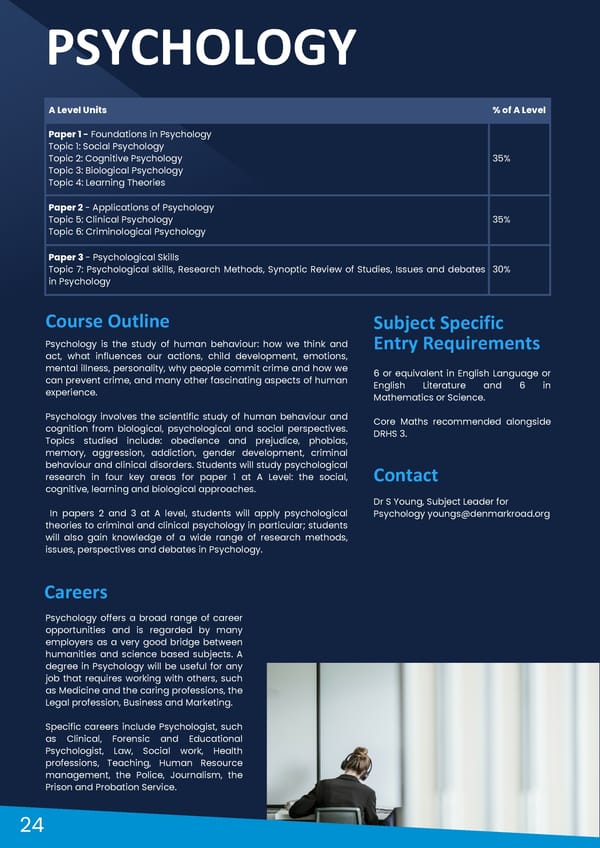PSYCHOLOGY RELIGIOUS STUDIES A Level Units % of A Level A Level Units % of A Level Paper 1 - Foundations in Psychology Unit 1 Philosophy of Religion 33.3% Topic 1: Social Psychology Topic 2: Cognitive Psychology 35% Unit 2 Religious Ethics 33.3% Topic 3: Biological Psychology Topic 4: Learning Theories Unit 3 Development of Christian Thought 33.3% Paper 2 - Applications of Psychology Topic 5: Clinical Psychology 35% Topic 6: Criminological Psychology Course Outline Super-Curriculum Paper 3 - Psychological Skills We attend one A Level Religious Studies is another name for Philosophy, Ethics and Topic 7: Psychological skills, Research Methods, Synoptic Review of Studies, Issues and debates 30% Philosophy/Ethics conference, where Theology but it is oh so much more than that! in Psychology we hear philosophers lecture and debate issues relevant to the syllabus. Students of Religious Studies will grapple with issues that have We invite in speakers who are relevant ultimate meaning - What is human nature? What is right? How to the course. We discuss films and can we know? Where does God fit into this all? Does God even Course Outline Subject Specific their philosophical/ethical themes. exist? Psychology is the study of human behaviour: how we think and Entry Requirements act, what influences our actions, child development, emotions, Religious Studies has 3 main overarching themes: Philosophy, mental illness, personality, why people commit crime and how we Ethics and Development of Christian Thought. 6 or equivalent in English Language or can prevent crime, and many other fascinating aspects of human English Literature and 6 in Subject Specific experience. Philosophy is thinking about Big Questions such as Do people have Mathematics or Science. souls? How strong is the evidence for God existing? Can you call Entry Requirements Psychology involves the scientific study of human behaviour and anything evil? If so, what? How relevant are Plato’s and Aristotle’s Core Maths recommended alongside cognition from biological, psychological and social perspectives. 6 or equivalent in Religious Studies (full ideas to the 21st Century? DRHS 3. Topics studied include: obedience and prejudice, phobias, or short course) or 6 or Equivalent in memory, aggression, addiction, gender development, criminal English Language at GCSE if RS not Ethics covers topics such as Euthanasia, Business, and Sex. We behaviour and clinical disorders. Students will study psychological studied at GCSE. also study what different ethical theories (Natural Law, Situation research in four key areas for paper 1 at A Level: the social, ethics, Kantian ethics, and Utilitarianism) are and what they think Contact cognitive, learning and biological approaches. of these moral issues. We will also discuss the idea of defining Dr S Young, Subject Leader for goodness and whether people have a conscience and why? In papers 2 and 3 at A level, students will apply psychological Psychology [email protected] Contact theories to criminal and clinical psychology in particular; students Development of Religious Thought gives us the chance to go a bit will also gain knowledge of a wide range of research methods, deeper to see how Christian thought has changed over time. We Mrs C Dunnett, Subject Leader for issues, perspectives and debates in Psychology. will tackle questions such as Who is saved? Do heaven and hell Religious Studies really exist? Is God a she? How relevant is Christianity in world that [email protected] seems to be increasingly secular. Careers Religious Studies is a discursive A level, grounded in the past but relevant for the 21st century, so get ready to join in with your own Psychology offers a broad range of career thoughts and ideas. opportunities and is regarded by many employers as a very good bridge between humanities and science based subjects. A Careers degree in Psychology will be useful for any Studying Religious Studies is excellent training in thinking for job that requires working with others, such yourself, and it encourages open-mindedness. as Medicine and the caring professions, the Legal profession, Business and Marketing. It is highly regarded by universities and employers alike because it encourages students to analyse, argue and research Specific careers include Psychologist, such independently. Obviously, it leads well into further study of as Clinical, Forensic and Educational Philosophy, PPE or Theology, but the application of philosophical Psychologist, Law, Social work, Health ideas to practical moral issues is especially relevant for those professions, Teaching, Human Resource considering careers in the law, medicine or the media. The skills management, the Police, Journalism, the developed, such as critical writing, are transferable to any degree Prison and Probation Service. course, including English, History and Politics. 24 25
 Subject Guide (Sixth Form) Page 25 Page 27
Subject Guide (Sixth Form) Page 25 Page 27